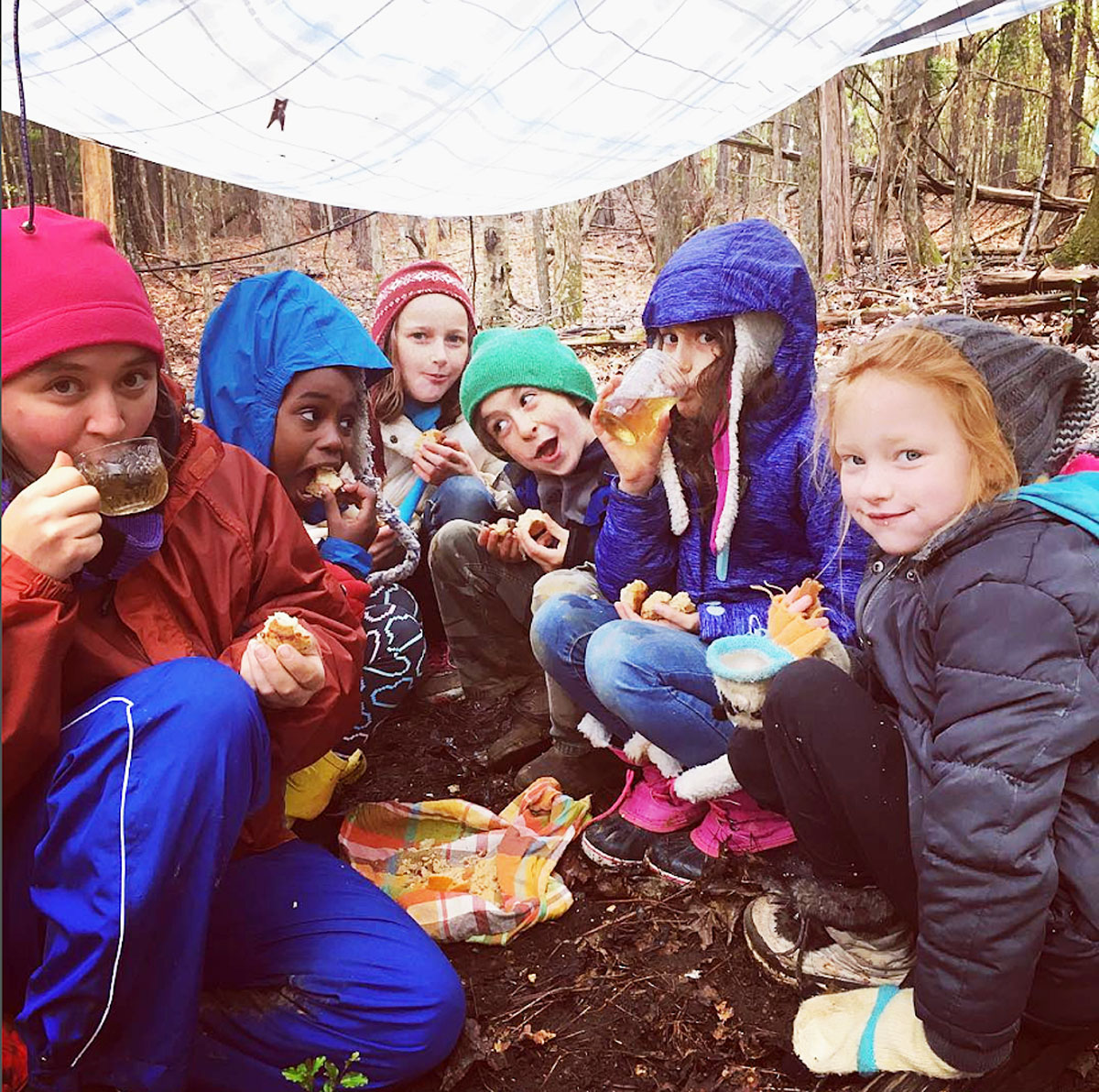Footsteps crush fallen leaves, and birds call from high in the trees. The kids run ahead laughing and yelling into the Whirlpool Trails and wait for their leader, Katie Boyle, to start the day’s adventure with them.
Boyle has been an environmental educator for 15 years and started Oxford Wonder Walks three years ago because she wanted a way for children to learn in an outdoor setting. Her students range from ages 2 to 12 and are separated into age classes on different days.
“Shhh, listen. Do you guys hear that sound?” Boyle stopped and asked as they entered the trails, where her classes take place each week.
[embedyt] https://www.youtube.com/watch?v=ovpaSDY8Dgk[/embedyt]
(Note: The 360 aspect of clicking and dragging around the video to view the landscape requires Google Chrome browser.)
The 7-year-olds and 8-year-olds stopped and looked around as Boyle explained it’s the sound of a Northern Parula bird and imitates the noise as they keep walking.
She raised the lid to the pot she brought to show that it holds lettuce. Even though the classes don’t require much planning, some days she brings a prop. She asked the kids to help her gather wild plants such as onions, spring beauties, dog fennel and wood sorrel to make a wild salad to eat that day at “Main Camp,” one of the popular spots the kids explore.
When Boyle began her environmental education classes, they were more structured, with lesson plans and worksheets.
“If we were doing a bird unit, I would make up worksheets about birds, and we would have to answer questions and be specific about bird calls,” Boyle said.
She eventually came to realize that all she needs in an outdoor classroom is a backpack, binoculars, water and a journal, along with enthusiasm and curiosity.
“My teaching style has evolved into a child-led, inquiry-based education,” she said.
She lets nature work, and she always teaches in the present moment.
“You can spend hours on one question, or you can move along to the next thing,” Boyle said. “Because they’re using their own enthusiasm for learning to guide (them).”
Boyle wasn’t always used to the natural environment; she spent much of her childhood in the suburbs of New York City, but her “adventurer” mom introduced her to the outdoors with camping, girl scouting and gardening.
After earning her English degree, Boyle joined an environmental AmeriCorps program for which she worked in parks and communities in Austin, Texas.
“I started to do some teaching with what I had learned and found that I loved sharing this joy with other people,” Boyle said.
She and her family moved to Mississippi in 2008, when Boyle began working as the environmental education director for Strawberry Plains Audubon Center.
She noticed that the adults she met in Mississippi saw value in kids spending time in nature. Unlike Boyle during her childhood, these children spent hours of their day playing in nearby creeks or listening to meadowlarks.
“This was just sort of the everyday person,” she said. “I wanted to be a part of this Mississippi, nature-led childhood.”
Boyle belted out an owl sound and waited for her students to echo it back, their common way to locate each other if some venture farther away than others. She directed them to sit in a circle as she passed out plates of wild salad to the kids and, once again, explained each plant that was put in.
“Being outside creates an environment in which you don’t have to teach what to learn. You are more focused on how to learn,” Boyle said. “So we find something that we are discovering together.”
She said they do a lot of watching and observing. When viewing an animal, they notice its behavior or coloration, and when talking about a plant, they notice the parts that make it unique.
“To be a part of any working environment requires critical thinking, empathy, teamwork and being physically able to handle a situation,” she said. “Those are the skills that I see developed in Wonder Walks.”
Once an ant pile is disturbed, the ants carry their larval babies deeper into the ant mound for protection, Boyle explained to the 2-year-olds and 3-year-olds pointing at an ant pile.
“You start to get a sense that these are social animals,” she said. “They do things as we might do things.”
Boyle said that forming empathy with animals and plants influences children’s relationships with other people, too.
She said she enjoys the noncompetitive aspect of Wonder Walks, giving children an opportunity to work together to find solutions to problems.
“I’m going to give each of you an item, and you’re responsible for using your item to build a shelter,” Katelynn Dillard, Boyle’s co-leader for the group of 7-year-olds and 8-year-olds, said as she handed out ropes, clips, bungee cords and a bed sheet.
Dillard and Boyle met several years ago when Dillard ran the childrens’ activities at Oxford’s farmer’s market. Boyle would drop her two kids off with Dillard.
In the spring of 2017, Boyle asked Dillard to be co-leader for her group of 7-year-olds and 8-year-olds.
“I loved going outside, exploring and teaching in the natural environment,” Dillard said. “I find it hard to learn about nature in a classroom.”
Dillard pointed to a pine tree and motioned around it.
“If you’re looking at a pine tree, you’re looking at what’s growing around it,” she said. “It’s not such an isolated thing in the real world.”
On shelter-building day, Boyle brought hot water in a container and helped the kids make wild tea by picking young rose leaves, baby sweet gum leaves, sorrel leaves and other edible aromatics and adding them to the water.
Once the children built their shelters on that cold and rainy Saturday in April, everyone sat in a circle. Boyle pulled small glass cups and muffins from her bag. Everyone passed around the hot, homemade tea as she read a story about ocean exploring. The kids oohed and aahed at the whale pictures in the book.
“This might be a memory that they hold on to forever,” Boyle said. “How wonderful would that be if they could remember not only being happy in the woods but (also) feeling safe and being with their friends and being connected to this world that we live in?”

Once she let go of the structured, results-based education style, Boyle said she couldn’t believe how much fun she began to have.
“[The kids] were giving back to me some of the curiosity and joy that I had forgotten about,” Boyle said. “I can’t feel anything but grateful that they force me to shed my own self-consciousness and be right there with them getting as muddy and being loud and laughing.”
Boyle said when the kids first start her class, they are quiet and stay right by an adult’s side.
“There is a lot of ‘I can’t do this’ or ‘I’m tired,’ and you hold their hand while they cross a log,” she said.
Eventually, they gain more confidence, run ahead on the paths and walk across the logs without help.
Katie Patrick attends Wonder Walks with her 2-year-old son, Thomas.
“This is an important, hands-on learning experience for kids,” Patrick said. “You can learn so much more through exploring than you can with formal lesson plans, and it’s important to start at a young age.”
Patrick said she hopes it will instill in Thomas an appreciation and respect for nature.
In addition to their growing confidence and familiarity with the both the trails and Boyle, the children also don’t feel scared of nature anymore.
“One of my main goals with Wonder Walks is to have people feel like the forest is an extension of their lives,” Boyle said.















